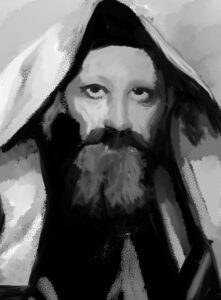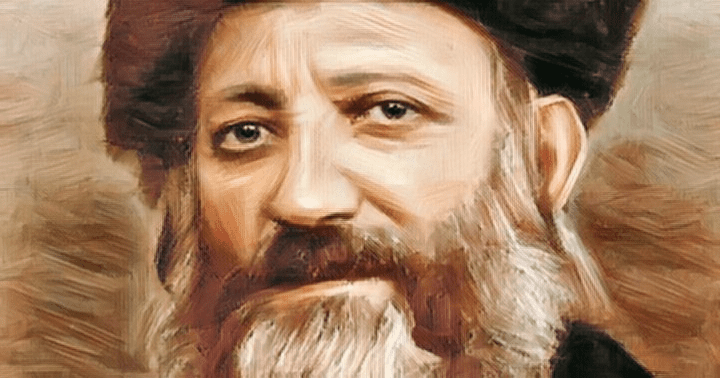THE IMPURE SHOFAR
by Tzvi Fishman
Regarding the situation of Jewish communities in Europe, Rabbi Kook had gnawing forebodings about the terrible catastrophe which lay ahead. In the year 1933, on Rosh HaShanah, he delivered an unforgettable sermon in the Hurva Synagogue in the Old City of Jerusalem. The Chief Rabbi began, commencing with a verse from the prophet, Isaiah.

“And it shall come to pass on that day, that a great shofar shall be blown, and they shall come who were lost in the land of Ashur, and the outcasts in the land of Egypt, and they shall worship the L-rd on the Holy Mountain in Jerusalem.”
Hearing the Chief Rabbi utter the prophecy, his close friend, Rabbi Harlop noticed that all faces were riveted on the exalting holy figure standing on the bimah. There could be no doubt that Hashem’s promise to redeem His People was coming true in their time. The Jews from all over the world who filled the crowded Hurva Synagogue were living proof that the long-awaited ingathering of the exiles was already underway.
“In another few moments, we will all pray the holiday Musaf prayer, ‘Our G-d and G-d of our Forefathers, sound the great shofar for our freedom….’
“The Prophet spoke of the ‘great shofar’ of Redemption, and we pray to sound a ‘great shofar’ – specifically a ‘great shofar.’
“There exist different levels of the shofar of Redemption. There is the great shofar; the regular average shofar; and the small shofar. In parallel, the laws of Rosh HaShanah list three types of shofars as well. If possible, a ram’s horn should be used. If a ram’s horn isn’t available, other types of shofars are allowed. A shofar from a non-kosher animal, and a shofar taken from an animal that was used in idol worship, are forbidden. If no kosher shofar can be found, it is permissible to sound a non-kosher shofar, but without reciting a blessing. If one of these were sounded, the commandment of blowing the shofar has been fulfilled. These different levels prescribed for Rosh HaShanah parallel the different shofars of Redemption.
Having heard many Torah lectures from Rabbi Kook, it was obvious to Rabbi Harlop that on a public occasion like this, he was not giving a dry halachic lesson about shofar blowing, simply stating the laws, but rather using the shofar to present a far deeper idea. Rabbi Kook continued:
“First, we have to understand the meaning of Redemption. For the Jewish People, Redemption heralds the ending of our exile in foreign lands, and the re-establishment of independent Israelite sovereignty in Eretz Yisrael. We are redeemed from subjugation to the nations. Through terrible world conflagrations, international agreements, and the pioneering self-sacrifice of our People, Hashem brings us home. Our Sages teach that the Redemption unfolds slowly, ‘kimah kimah,’ a little at a time, like the dawning of a new day, gradually, in a developing process which returns the Jewish People to its Land, its Kingdom, and it unique Torah life.”
All eyes remained fastened upon Rabbi Kook. In his public speeches, he had a way of expressing the deepest spiritual concepts in a way that even a simple Jew could understand.
“What is the essence of the shofar of Redemption – what we call the ‘shofar of Mashiach’?” Rabbi Kook asked, speaking loudly so that his voice would carry to the upper balcony where the women sat quietly listening to the cherished Chief Rabbi.
“When we say, ‘the shofar of Mashiach,’ we mean the forces stimulating the Nation of Israel toward rebirth and Redemption. This sounding of the shofar gathers the exiles and the scattered outcasts, and brings them back to the Holy Mountain in Jerusalem, where we are gathered today. The righteous souls of the Nation hear the call of this ‘great shofar’ and yearn for our full Redemption – which will lead to the Redemption of the world, when all of mankind ‘will flock to Jerusalem to learn the ways of the G-d of Jacob.’
“There are other Jews whose religious sensitivities have weakened and who feel distant from exalted religious teachings, but whom nonetheless retain healthy human natures, whose roots also derive from the realm of the holy.”
Rabbi Harlop knew that Rabbi Kook was referring to the secular pioneers.
“And this healthy nature includes the natural desire to be sovereign in one’s own Land, to liberate oneself from foreign rule and to live a free life, just like other nations. This natural national desire is exemplified by the normal shofar which is commonly found. Although it is a kosher shofar, the commandment is more completely fulfilled with the great shofar, exemplified by the righteous of the Nation.”
Rabbi Kook paused. Suddenly, he looked down at the pulpit and broke into tears. The crowd reacted with stunned silence. Seeing what no one else saw, the Chief Rabbi rested his head in his palm and sobbed. With a deep breath, he regained his composure and continued:
“There is also a third level of the shofar of Mashiach. This is the non-kosher shofar, which is only blown from necessity when no kosher shofar is available. When there is an absence of holy exaltation and the yearning for Redemption that stems from it; and if the natural, healthy, yearning for nationalism is also missing; then it is impossible to sound a kosher shofar of Redemption, and then the enemies of Israel appear and sound an impure shofar of Redemption in our ears. They compel us to hear the sound of the shofar. Without giving us respite, they noisily sound a warning siren in our ears, the cries of persecution and oppression, which force us to look toward the Land of Israel for refuge. In this case, the horn of an impure beast becomes the shofar of Mashiach. This is the shofar of Amalek and of Hitler. They awaken in us the yearning for Redemption. And those who were deaf to the call of the first shofar, and to the call of the second, because their ears were sealed – they will hear, against their will, the blast of the forbidden, impure shofar – they will be compelled to listen.”
Rabbi Kook paused. A profound silence filled the hall.
“Even these people are considered to have fulfilled the commandment of hearing the shofar. However, over this shofar of affliction sounded by ‘the enemy of the Jews,’ there is no blessing, for over cursed afflictions we don’t recite a blessing.”
No one spoke, no one applauded, even the children sat still as Rabbi Kook concluded his sermon.
“We pray that the Holy One Blessed Be He will not compel us to hear the shofar of the impure beast. Yet the plain, ordinary shofar devoid of religious spirit cannot fully redeem a holy People. Thus we are filled with the prayer: ‘Sound the great shofar for our freedom,’ the shofar which derives from the holy depths of the soul of the Israelite Nation, out of the Holy of Holies of our beings – then the Redemption shall be complete.”
On Rosh HaShanah day, a decade before the Holocaust, all of the Jews in the Hurva Synagogue responded with a thunderous, “Amen!”






